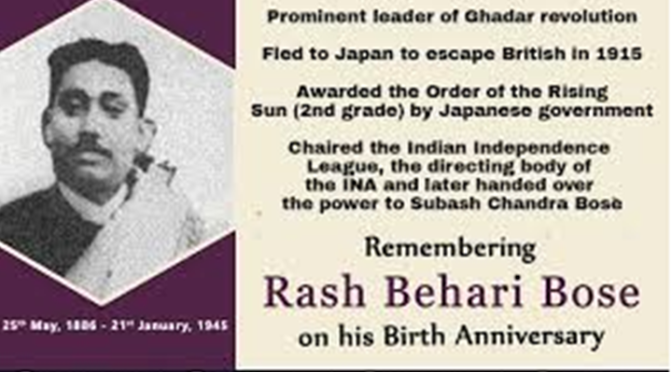Rash Behari Bose: Leader of Ghadar Revolution and Founder of INA
Posted on : August 26, 2018Author : AGA Admin

Rash Behari Bose was a revolutionary leader of an outstanding calibre, who contributed significantly in India’s fight for independence against the British. Bose was born on 25 May 1886, in the Burdwan District of West Bengal. Rash Behari was initially educated at Subaldaha under the supervision of his grandfather, Kalicharan, and later in Dupleix College at Chandan Nagore where he earned a degree in Medical Science and Engineering.
However, Rash Behari Bose was more interested in revolutionary activities and had learned how to make crude bombs even before he had passed matriculation. In 1908 he was implicated in the Alipore bomb case and was jailed. After his release from jail he went to Dehradun and joined as the head clerk at the Forest Research Institute. However, it did not stop him from having contacts with the revolutionaries secretly.
Rash Behari Bose came in to prominence of the Indian freedom movement after 23rd December 1912, when bombs were thrown at Lord Hardinge, the then Viceroy of India. Though the planning for the entire operation was done ingeniously, the plan unfortunately failed, and the Viceroy got seriously injured in the process. His fellow conspirator Awadh Bihari was hanged, but Rash Behari escaped without being implicated. He returned to Dehradun by the night train and joined the office the next day as if nothing had taken place. Further, he organised a meeting of the loyal citizens of Dehradun to condemn the attack on the Viceroy. For this, no one guessed that he had masterminded and executed this most outstanding revolutionary action.
Rash Behari Bose was one of the key organisers of Ghadar Revolution that aimed to attack the British army internally. This involved a larger area of operations i.e. an all India revolution concentrating primarily on the various cantonments. By 1914, about four thousand ‘explosive elements’, i.e. Ghadar elements came to India from America, Canada and the Far East, with arms and money. However, they lacked a proper leader which they found in Bose, particularly after the heroic Hardinge episode of 1912. It was in mid-January 1915, that Rash Behari first announced the news of the impending revolution at a private meeting at Benares. The war in Europe had already started, which would leave only thirty thousand men at home, most of whom were Indians and whose loyalty could be won over easily. The plan was to infiltrate the army cantonments with trusted Ghadarites. He even organised a few rehearsals at Khairon, Firozpur and Lahore. But unfortunately, the execution of the revolution was not successful as planned and it soon fizzled out , as the British government nipped the struggle at the bud.
Rash Behari Bose fled from Calcutta on May 12, 1915 under the alias of Priyanath Tagore to Japan. He lived mostly like a fugitive, changing his residence 17 times. During this period, he met Herambalal Gupta and Bhagwan Singh of the Ghadar Party. As Japan was an ally of Britain in the First World War they tried to extradite Rash Behari and Herambalal from Japan. Herambalal escaped to U.S.A. and Rash Behari ended his fugitive status by marrying Tosiko Soma and becoming a Japanese citizen.
Following the conference which was held in Tokyo on 28th March 1942 to discuss political issues, a decision was taken to establish the Indian Independence League. The Indian prisoners who were captured by the Japanese in Malaya and Burma were encouraged to join the Indian Independence League and the Indian National Army. It was due to the efforts of Rash Behari, along with Captain Mohan Singh and Sardar Pritam Singh, that the Indian National Army came into existence on September 1, 1942. Netaji Subash Chandra Bose was invited to become the President of the League and the baton of the force was passed over to him, under whom the formidable- ‘Azad Hind Fauz’ was born.
Rash Behari Bose died on January 21, 1945, in Tokyo. The Japanese Government honoured him with the ‘Second Order of the Merit of the Rising Sun’ before his death. His dream was to see his nation free from the clutches of the imperialists, and though he did not live to see India attaining independence, his immense contribution to the freedom struggle makes him an immortal part of it.
Shaivi Sen
Intern
AGA





Leave a Reply